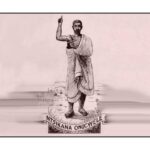ZANNAB, DABTARA
- 1 Min Read
Dabtara Zannab (who flourished in the 1850s and 1860s) also called Alaqa Zannab, was the keeper of the royal archives during the reign of Emperor Téwodros [reigned 1855-68], and was one of the two chroniclers of that reign.
Zannab’s chronicle was first published by Enno Littmann in 1902, and was translated into Italian by Martino Moreno in 1942. It was the first chronicle to be written in Amharic instead of the traditional Ge’ez (ancient Ethiopic), and is important not only historically but also linguistically as an early example of Amharic prose. The chronicle covers the years 1825-59, which is to say the period before Téwodros was crowned emperor, and also the first few years of his reign.
According to Hormuzd Rassam, the British envoy in Ethiopia from 1866-68, Zannab was a pious Christian and an able scribe. After the death of Téwodros in 1868, Rassam recommended to the leader of the British expedition which had overthrown him, Robert Cornelis Napier, through General W. L.
Merewether, that Zannab, a Protestant convert, should be attached as tutor to the son of Téwodros, Dajazmach Alamayahu. The recommendation was acted upon, but the Alaqa was subsequently discharged.
RITA PANKHURST




